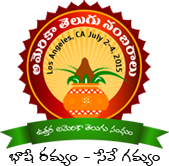
Scientific fraud and misconduct are not condoned at any level of research or competition. This includes plagiarism, forgery, use or presentation of other researcher’s work as one’s own and fabrication of data. Fraudulent projects will fail to qualify for NATS sambaralu team reserves the right to revoke recognition of a project subsequently found to have been fraudulent.
Every participant will receive a certificate of participation.
1st. 2nd and 3rd prizes will be awarded to each age group, total 9 prizes will be awarded in NATS Sambaralu 2015 Science Fair category.
The written report is a summary of everything that you did to investigate your topic. The written report provides others with vital information on what your project is about as well as its effect on your understanding of the topic. Usually the written report is 5-10 pages in length. All information must be included in the written report. This report provides you with the opportunity to think about all the aspects of our project and share your ideas with others.
All written report for a science fair project should include:
Title Page:The first page in the report should include the title of the project as well as the name and grade of the student.
Acknowledgment:Here is where you thank everyone who helped to make your project successful (including Mom and Dad.) Everyone that you interviewed, including teachers, scientists, and other experts in the field should be mentioned here. Table of Content: This page provides the reader with a list of the different parts of the project and the page number on which each section can be found.
Statement of Purpose:State the purpose of the project in the form of a question. Hypothesis: You must have a hypothesis before you complete the project. A hypothesis is an educated guess about what you think will occur as a result from completing your experiment.
Research:This is the part of the report that contains all the background information that you collected about your topic. Any books or articles read from the internet/journal, authorities on the topic that you talked to, or outside materials collected should be summarized in this section. This section should be written in your own words and NOT copied from your resources.
Materials:This is a list of all the materials and supplies used in the project. Quantities and amounts of each should also be indicated.
Procedure:You will list and describe the steps you took to complete the project. Usually this is listed in a numbered sequence. This part shows the stages of the project so that another person can carry out the experiment. Observations and Results: In this section, you will tell what you learned from the project. It is also IMPORTANT to include all graphs, charts, or other visual data (pictures) that helps to show your results.
Conclusion:This is a brief statement explaining why your project turned out the way it did. You should explain why the events you observed occurred. Using the word “because” is a good way to turn an observation into a conclusion. The conclusion should tell whether the hypothesis was proven or not proven. Also give the reason(s) why you chose to learn more about the subject. You could also add what you know now that you didn’t know before you completed your project.
Reference Page:The bibliography should list all the printed materials the student used to carry out the project. Items should be listed in alphabetical order in a standard format.
.jpg)

A lot of kids are scared of speaking in public or to a judge. Just imagine they are a fellow scientist who just wants you to share what you learned.
Relax, smile, and have fun. Remember, you are the expert and you had fun doing the project. But if you are a little nervous, we listed some things that you need to do during the presentation.


